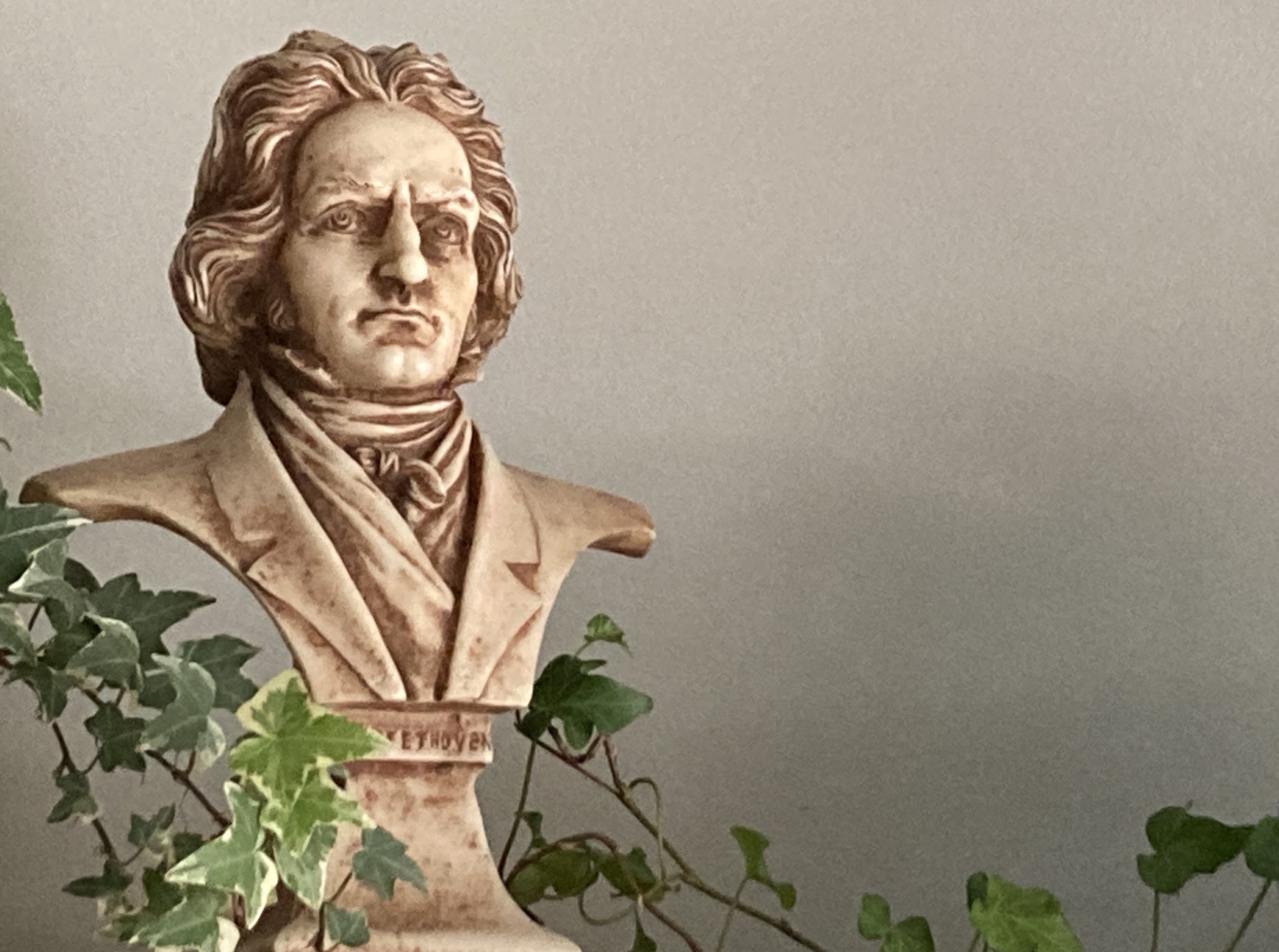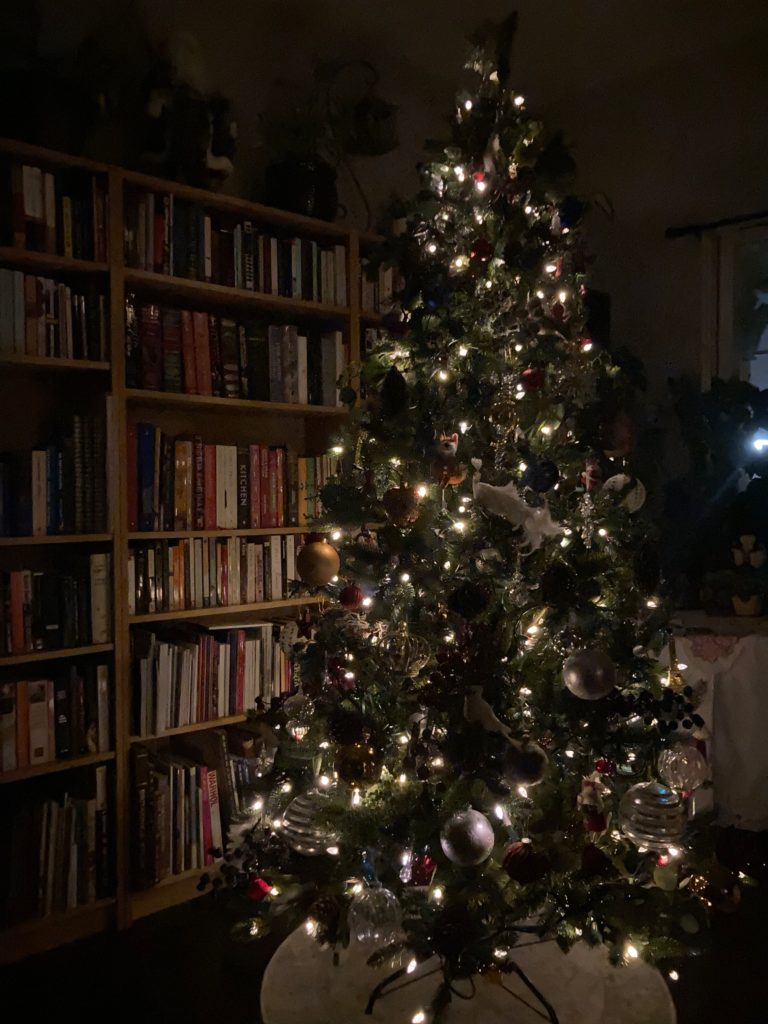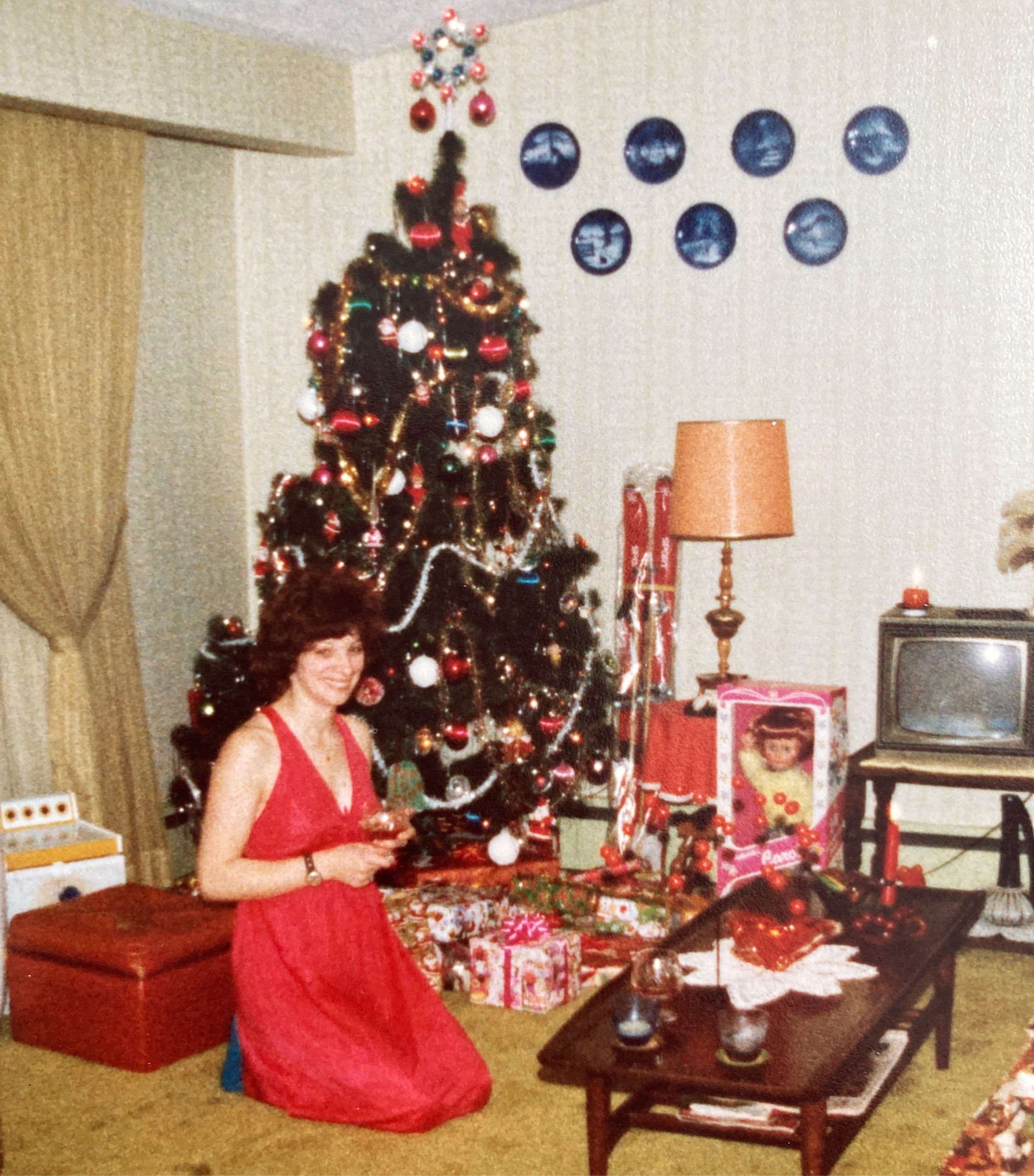This year’s edition of the Enescu Festival came to a close with a sharp contrast of good news and bad news. The good news is that Romanian conductor Cristian Măcelaru, currently Music Director of the Orchestre National de France in Paris and Chief Conductor of the Orchestre National de France, will be entering the role of Artistic Director of the Festival, taking over from Vladimir Jurowski, who this autumn has begun his tenure as Music Director of Bayerische Staatsoper, in addition to his duties as Chief Conductor and Artistic Director with the Rundfunk Sinfonieorchester Berlin. Along with duties in France and Germany, Măcelaru is also Music Director of the Cabrillo Festival of Contemporary Music in California, and Artistic Director and Principal Conductor of the World Youth Symphony Orchestra at the Interlochen Arts Center in Michigan. He won a Grammy Award in 2020 for conducting Wynton Marsalis’ Violin Concerto with Nicola Benedetti and the Philadelphia Orchestra (Decca Classics). Timișoara is his hometown, which is where the next Enescu Festival is set to take place, in 2023. With such intercontinental experience, particularly within the realm of administration and festivals, Măcelaru may very well be the right man for the right job, coming in at just the right time, but just how much of that precious time he’ll be spending in Romania as a whole, especially in the coming months, remains, like much of the festival, an ever-shifting question mark. Classical, as a whole, has largely gone back to a sort of normal (ish), with an added frenzy provided by playing a massive, years-long game of catch-up, following months (sometimes years) of non-activity. Măcelaru’s responsibilities, like those of many other conductors right now, are mounting, outside of whatever tentative plans may already exist for 2023.
The bad news for the Romanian festival is that it’s losing its longtime General Director. Mihai Constantinescu is stepping down from what has been, one may safely assume, a hectic quarter-century of service. Very much a force behind the biennial fest, Constantinescu was also a continual presence who could be seen at any number of live presentations, backstage and in the audience, always talking to numerous people in-person or on the phone, via email, in messages. Along with arranging for artists (this year’s edition hosted 3500 of them according to the festival website), Constantinescu regularly liaised with branches of government, major sponsors, and all manner of management, marketing, publicity and touring teams to produce a busy, buzzy fest spread over several venues in Bucharest proper, as well as towns across the country. To see him at any point during the festival was to see the contemporary concept of “hustling” well and truly manifest. And no wonder: this year’s festival, its 25th, hosted a total of 78 concerts in Bucharest, and 13 events in other cities. That’s a scaleback given its usual size and sprawl, and one wonders how that sprawl might translate from Bucharest (population 1.83 million) to the smaller city of Timișoara (population roughly 306,000). Geographically the city is closer to the Hungarian town of Szeged than to Bucharest; having a more westerly locale may give the festival a more immediate presence (and easier, driveable access) through central and Western Europe, which may well benefit those visiting organizations, but proximity aside, the city has another reason for being an interesting choice for the future. Timișoara was the site of government demonstrations in 1989 that spread nationwide, ones that led to the execution of dictator Nicolae Ceaușescu (1918–1989) and his wife on Christmas Day of that year; whether or not these events enter into or influence the shape of the festival is a huge question mark. The festival, for all its ambition, could certainly do with a more specific vision. It will be interesting to see, over the coming weeks and months, the extent to which Constantinescu’s exit, Măcelaru’s entrance, the roles of history, memory, and geography might play. The question, as ever, remains: will audiences follow, go, support – locals included, or perhaps especially?
The Enescu Festival is one of the world’s Top 5 classical festivals, as its website proudly notes. This year’s fest featured continual enforcement of health codes, ones that become more stringent toward the closing in late September. Masks backstage became not optional, but de rigeur, for artists and visitors alike. What with an alarming pandemic situation (one which has steadily worsened in the weeks since the final note sounded), conductor and former Festival Artistic Director Lawrence Foster made an impassioned plea for vaccinations from the stage of the ornate Romanian Athenaeum, a landmark in the city opened in 1888. Before a small if attentive audience, Foster was leading an in-concert performance of Berg’s Lulu with the Transylvania Philharmonic Chamber Orchestra of Cluj-Napoca, in a reduced orchestration by German conductor/composer Eberhard Kloke and featuring young German soprano Annika Gerhards in the title role. During his speech, Foster (who revealed he’d had COVID 19 himself) also saluted the work of Constantinescu and shared his own personal memories of working with the outgoing General Director. One had the impression everyone, onstage and off, was simply grateful to be there, in this, of all years. Yet the fact the festival (which Yehudi Menuhin supported in its earliest iterations) exists into the 21st century is a noteworthy thing. Since its inception in 1958, it has hosted a good number of big names, sometimes more than once (Joyce Di Donato, Valery Gergiev, Yuja Wang, Gautier Capuçon) with concerts through most of September presented every other year, alternating with the Enescu Competition for young musicians. Local audiences are given numerous opportunities to experience the work of artists and orchestras who don’t normally appear otherwise, and to experience live work that isn’t normally played or programmed across much of the country. Those benefits extend to tourists; tickets (and indeed, hotels, food, attractions) can be had for a fraction of the cost of going to Vienna, Paris, or Munich. The savings are concomitant with difficult historical and political details in a place that still struggles to fit a terribly difficult past with a very fraught future, and some Romanian musicians have quietly complained that the Enescu Festival gets the lion’s share of funding (it being a big glamorous event that attracts foreign talent and visitors), while local companies are left to wither. While the festival features numerous Romanian musicians, artists, and orchestras, at my visit to the country in 2019, I kept hearing, repeatedly, sentiments that “the system isn’t fair” and “we feel ignored.” Such criticism isn’t new but is indeed valid, and worth heeding; there is a sharp and visibly distressing disparity between Western and Eastern EU countries.
The country has one of the widest gaps between rich and poor in the EU, and according to political scientist Iulian Chifu, who was an adviser to Romania’s president between 2011 and 2014, “corruption is the new communism.” Romania, with its painful past and seemingly-inert present, with a lack of socio-political willpower enmeshed with widespread (and again, distressing) corruption, horrific rising COVID rates (roughly 15,000 a day), government officials at odds with health officials, immense church influence across swaths of society, and a rapidly rising tide of right-wing political populism, such criticism feels both spiky on the surface and sharp around the edges; such realities have the very real potential to take a big bite (or two, or more) out of the country’s biggest and arguably most famous festival. The sentiment of many in Bucharest (and the wider country) of feeling ignored, of having their concerns be ignored, still strongly influences my memories of the city three years on, recalling the many sites that confirm the country’s painful past whilst at the same time trying, desperately, to paper it over. The immense Palace of the Parliament, built in 1977 by dictator Nicolae Ceaușescu , stands like a stern monolith in the middle of Bucharest, and its ghosts, even in the day, seem eerily intact; passing by after dark is shudder-inducing. It was surreal to visit the truly excellent National Museum of Contemporary Museum (MNAC), which is housed in one of the palace’s wings; even with its modern renovations and inspiring collection of abstract works, the building renders the presence of its creator a little too present, with its windows that look down menacingly upon various passers-by. A disparate group of elements always seems to be living next to each other in Bucharest, and no single can be discerned, let alone resolved; history, art, money, power, corruption, poverty, inequality, stagnation, and some form of glamour (which the festival has certainly celebrated and promoted) are neighbours in this post-communist society. The delicate layers of sonic magic from a concert just experienced seemed to wilt like petals with every evil glint from those palace windows, and the choice to run across the street, as it turns out, was obvious, and not only owing to impatient traffic lights and the aggressive drivers who seem to dominate the city’s roads.
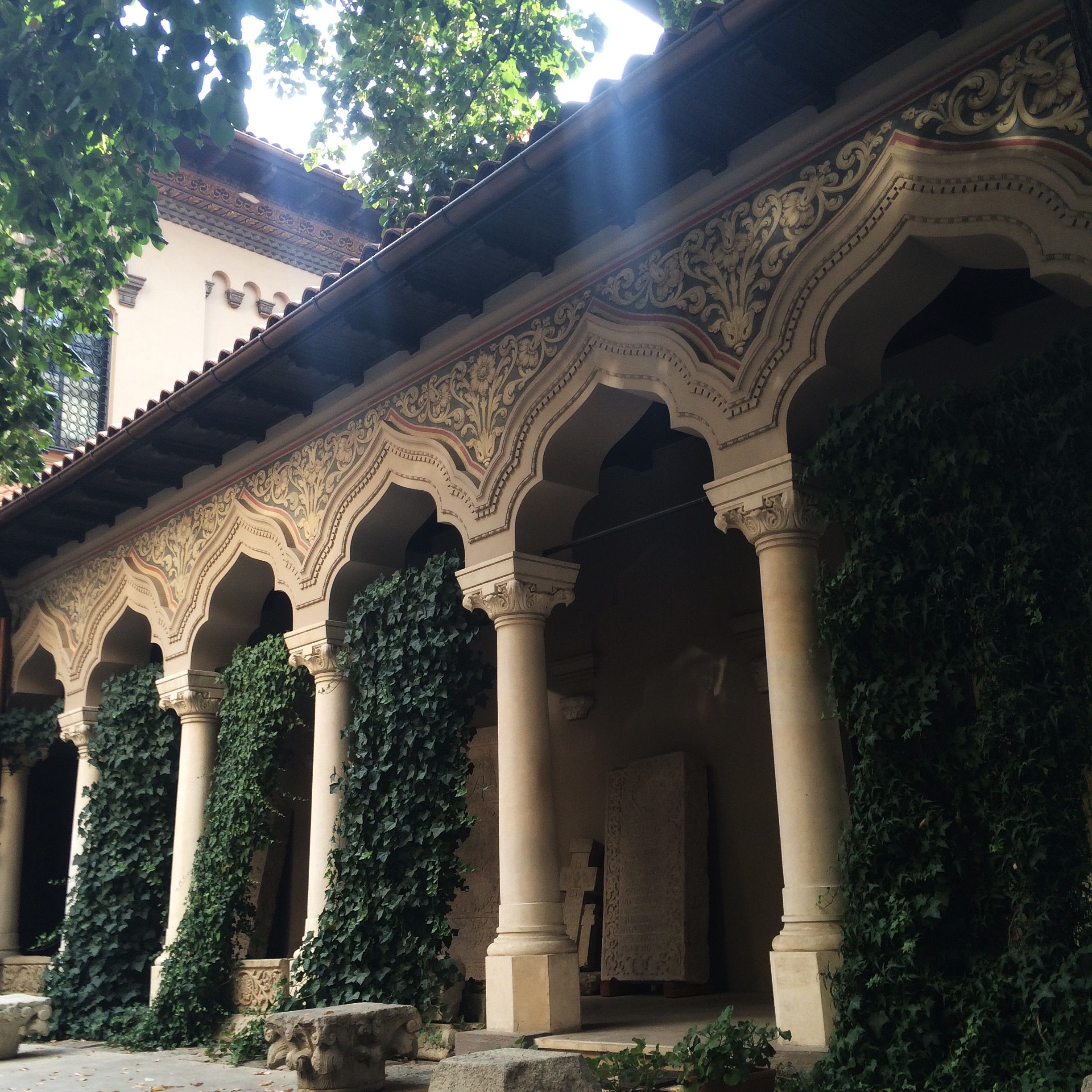
One side of the garden of the Stavropoleos Church and Monastery in Bucharest. Photo: mine. Please do not reproduce without express written permission.
Several ideas for repurposing the palace were tossed around after the 1989 revolution; possibilities included a casino, a mall, a Dracula theme park (!) before the decision came to maintain it, and to house Romania’s government within. For all its grim history and overblown pretentiousness, the structure gives a shred of order to what is a mostly chaotic urban layout. Wherever I wandered; I always managed to reorient myself in relation to its sprawling centrality. As Shaun Walker noted of Bucharest in The Guardian in 2019, “Decaying art nouveau mansions mingle with brutalist communist architecture. The city sprawls over a huge area and traffic is appalling. Masterplans for urban renewal have been written and ignored. The quarter around the Palace of the Parliament is perhaps the only area with orderly streets and layout, but has a soulless feel. “The whole ensemble makes no sense in relation to the rest of the city, and does not fit on the city’s main transport axises,” said Andrei Popescu, an urban planner and tour guide.” That delicate – some might say dysfunctional – infrastructure comes to light in ways one wishes weren’t so intermingled with the festival’s functioning, but geography, politics, the simple reality of Eastern Europe and the EU in the 21st century all make that impossible. Zig-zags of streets, punctuated by wide avenues pregnant with a seemingly endless zipper of roaring cars are, together with sidewalks, cracked, uneven, poorly lit, crumbling. They extend well past the immediate festival area into the touristy Old Town (surely a tip-off of a title), where the tiny if utterly delightful Stavropoleos Church and Monastery sits, a quietly elegant Orthodox jewel. Forget the giant Orthodox cathedral-monoliths dotting the city (including the one beside the palace itself); small is definitely beautiful, as the Stavropoleos so quietly, beautifully proves. A visit there, and a silent sit in the adjacent gardens, is good, and needed, medicine for the soul.
Close by is the bustling Romanian restaurant Caru’ cu Bere. Stained glass and wood panelling inside, with an expansive patio at the front, it (like the fest favorite, Romanian restaurant La Mama) features a distinctly Eastern European mix of offhand service, huge portions, reasonable price tags, rich, garlicky flavours and spicing that simultaneously embrace tradition and cross continents, their rich tastes intermingling with cigarette smells and loud laughs. Don’t go to such places if you’re alone, or rather, do go, but solo diners should be fully prepared to be largely ignored and exposed to numerous many happy young faces enjoying an extended summer. Many of them belong to visiting musicians in orchestras from everywhere; I heard Finnish, Russian, Italian, English, Norwegian, German, and French the times I visited these establishments, and others like them, through the afternoons and evenings between and around concerts. It was fascinating to see an assortment of musicians there, sometimes hours after a performance (or before), a concert in which they’d been more dressed, less free, but oh, young, beautiful, eyeballing every move of maestro, as if on some kind of shabby-chic safari. Oh, to be a young musician in Bucharest on a sunny day or starry evening during the festival, sipping beer in a garden with fellow minstrels, gossiping about the soloist, fidgeting with hair, smirking at the Sala’s notoriously poor acoustics, as the (male) musicians, spread around pushed-together tables, smile and nod silently, staring at bare shoulders and pert bosoms, holding up empties at the frowning, perspiring servers who would invariably scurry back with a full tray, plates of little sausages, fried potatoes, glinting shards of vinegar-dressed cucumber. Clouds of smoke would hang in the humid evening air like thought bubbles containing that word so present on everyone’s lips and minds: freedom.
Some way or another, the lot of them realized that concept, with varying degrees of success, at (perhaps ironically) the Sala Palatului, an acoustically dire hall built under the country’s Communist regime in 1959-1960, with its shabby velvet seats and worn floors and thick walls, amidst air so still and sweltering one could carve it with that little sausage knife. Modern sounds, amidst old Communist history; contradiction as balance. It would be the jolt the festival (country) needs, but oh the sound was (is) so bad. Whether or not Culture Minister Bogdan Gheorghiu will give a green light to that long-needed, much-requested new facility is an open question. With a background in theatre and television, Gheorghiu was, at the time of his appointment in May 2019, the fourth person to hold the position since 2015. Worth noting here is the Arena Națională, the largest sports arena in Romania, was opened in 2011, and cost €234 million. Earlier this year it hosted the UEFA European qualifying matches. Without going into tiresome false equivalency arguments around sports and arts, and populism and culture, what is notable is the just how quickly the government gears will turn, when, why, and for whom; it is a truth universally acknowledged that a small country in possession of a smaller budget must be in want of a big audience, with bigger wallets. “Every government from 2003 wanted to build a new hall, but every government refused to do it,” Constantinescu told me in 2019, “they told us in the beginning,”We’ll do it” but when the moment came, said, “We don’t have money or time” and “Oh, you need a different (location) for this hall.” It’s stupid, this is the best situated place in Bucharest – the hotels are here, the underground, buses – why move it? Bucharest doesn’t have so many places where you can situate a big hall.”
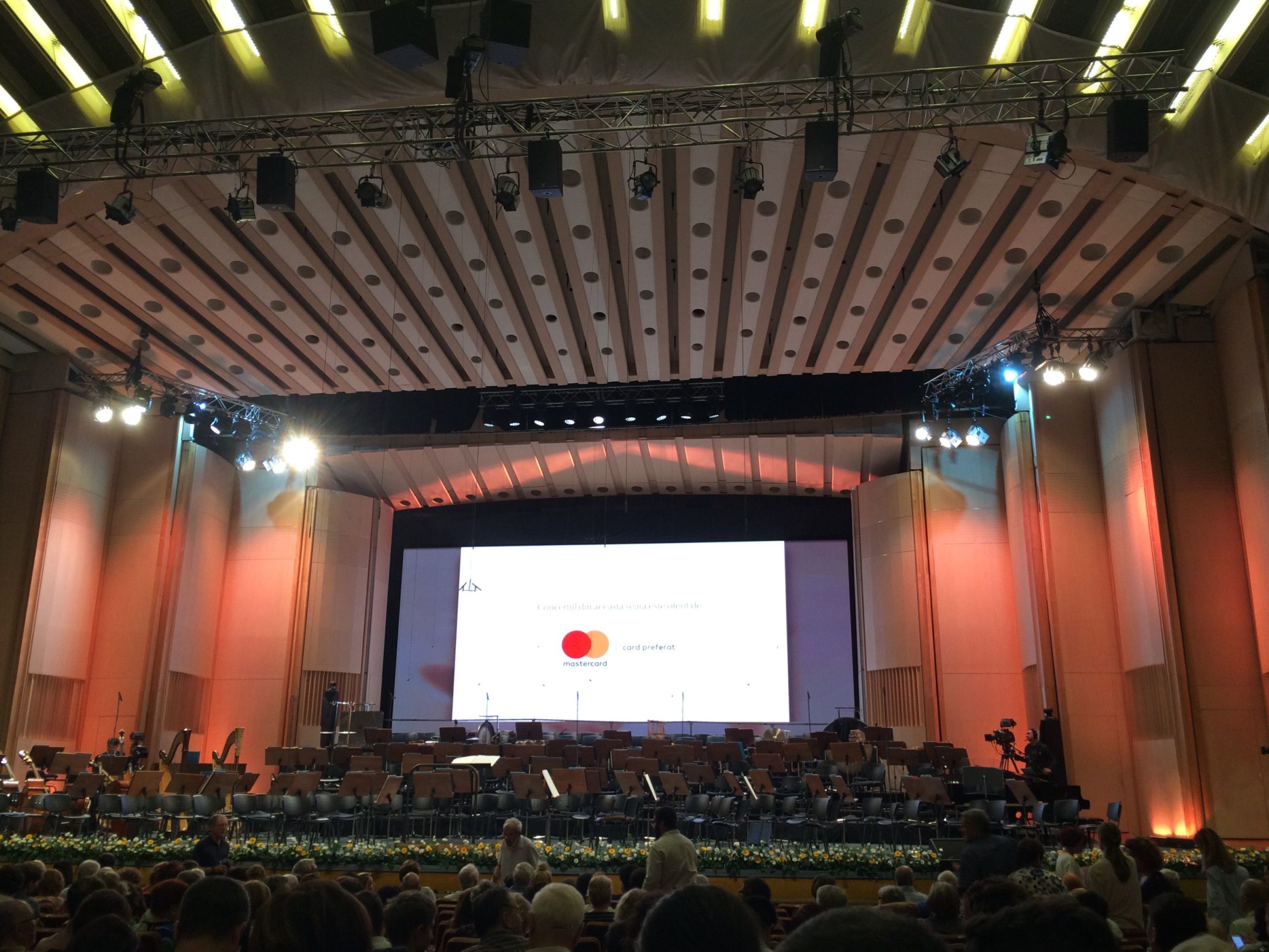
Inside the Sala Palatului in Bucharest. Photo: mine. Please do not reproduce without express written permission.
When Jurowski presented an in-concert version of Enescu’s 1931 opera Œdipe at the Sala in 2017, Bachtrack writer Aksel Tollåli noted that “the loudness of the magnificently played orchestral climaxes was swamped, reducing what could and should have been a tidal wave of sound into a trickle.” At the close of this year’s festival Jurowski commented that “I think what it most needs is a concert hall. It has been promised to us by so many ministers of culture, I have seen three or four who have come and gone; they all made this promise, which remains unfulfilled to this day.” Any given performance at the venue at least during festival time, requires spending money on a seat near the front, or else much will be lost sonically; I did this, more than once, and found a better if no less troubling acoustical experience. Sitting further back one will observe audience members shaking fans and programs back and forth, dabbing foreheads with embroidered hankies, anxiously awaiting the appearance of a nattily-dressed soloist playing that popular violin or piano or cello piece, then exiting at intermission or more notably during any not-mainstream work that might come after, Enescu symphonies included. They want what they know; sometimes, usually, the festival obliges.
“I’ve always observed it’s a vicious circle,” Jurowski said at a press conference just prior to the start of his tenure in 2017, “(that) conductors and orchestras come, visiting the festival, and all they usually put on their programs is hits.” Audiences, as anyone who’s been to the fest will attest, eat it up. Why shouldn’t they? Having performed Brahms’ famous Violin Concerto in D Major at the fest in 2019, violinist Julia Fischer (performing with the Rundfunk Sinfonieorchester Berlin, led by Jurowski) was greeted with such sustained, loud, and enthusiastic applause, it seemed impossible to oblige with anything less than an intensely-delivered encore. (Attendees certainly would’ve liked more, something violinist Ray Chen did provide thereafter, following a performance with the State Academic Symphony Orchestra of Russia Evgeny Svetlanov and conductor Gabriel Bebeșelea.) Similarly, Grieg’s Piano Concerto in A minor, performed in 2019 by Leif Ove Andsnes and the Oslo Philharmonic and led by conductor Vasily Petrenko, was wildly received. Petrenko, an affable presence and meticulous conductor, indulged the packed Sala, following a sweeping performance of Tchaikovsky’s Symphony No. 5, with warm smiles to the audience and directions to clap along. He was met with cheers, whistles, numerous camera-phones held aloft before-during-after. In a small room set aside for media interviews at the hall the day before, Petrenko said he felt it was a “duty” for him to perform contemporary works alongside the so-called hits; on the program for one of his concerts with the Oslo Phil was Morgon i skogen (Forest Morning) by Norwegian composer Øyvind Torvund (b. 1976.) Neither the instinct nor the inherent risk to pair the new, and mostly strange, with the known, and mostly beloved, is confined strictly to Western orchestras, many wringing their hands over how to strike the right balance while attracting their own set of new and old audiences. “I think classical music should be alive,” Petrenko said, his blue eyes shining, “it should not be a museum, and the only way to have it alive is to perform new pieces. And I think it is the duty of every conductor and orchestra to perform music of local composers – if a piece is not played, it does not have a chance; we have to give a chance for them. If we don’t, who will?”
Indeed, Enescu himself, whose 140th birthday was marked this year, is among those “local composers” to whom Petrenko was referring, and his work has been a mainstay of the festival. This year, he took the opportunity, in his new capacity as Music Director of the Royal Philharmonic Orchestra, to lead a series of works over two nights that prominently featured the work of Enescu. The composer’s Strigoii, which started out as a piano sketch for an oratorio in 1916 and was “assembled” in the 1970s by Romanian composer Cornel Țăranu (with orchestration by conductor/composer Sabin Pautza) was presented in Romania for the very first time this year, by the George Enescu Philharmonic under the direction of conductor Gabriel Bebeşelea (who has become something of a champion for the work, recording it in 2018 with Capriccio Records and the Rundfunk Sinfonieorchester Berlin). Cristian Măcelaru led the Orchestre National de France in a pair of concerts over two consecutive nights featuring the music of Shostakovich, Ravel, Dutilleux, Messiaen, Grieg, as well as Enescu, the latter featuring multimedia visual accompaniment by Romanian theatre director Nona Ciobanu and Slovenian artist Peter Kosir, part of the festival’s ambitious integration of various art forms through the medium of music.
Claims that the festival may have had some hand in the ascension of Enescu’s opera Œdipe, first presented in Paris in 1936, and being presented this season at both Komische Oper Berlin and Opera de Paris, speak to a certain optimism of influence, but such claims are not entirely accurate, especially if one considers the number of years opera houses plan in advance (at minimum four; usually more) and the demands being placed on the industry for new – but not too new – material. Wiener Staatsoper presented the opera as far back as 1997; La Monnaie/De Munt produced a staging (a co-production with Gran Teatre del Liceu and Teatro Colon) in 2010, one that was later produced (and revived) at Dutch National Opera. The Royal Opera Covent Garden staged Œdipe in 2016; the Salzburg Festival in 2018. It was also staged in Romania, by the Opera Națională București, in 2015 and again in 2019. Certain houses, under pressure to present newer material and to expand the so-called ‘canon’ of core repertoire (Verdi, Wagner, Puccini) might wish to embrace the sole opera of a Romanian conductor/composer/violinist, famous for his widely (some might argue overly) programmed Romanian Rhapsodies, inviting their respective audiences to experience a work that, while new, isn’t so far afield sonically; the work clearly references the music of Strauss, Debussy, and Ravel, thus retaining a perceived “safety” in having European roots. (It’s worth noting the opera is usually marketed sans the tiresome cliched Eastern exoticism that usually tends to otherwise characterize many Western initiatives involving the work of composers from Romania and much of the former Eastern bloc.) The opera has as its basis a widely-known story taken from Greek mythology, giving directors a wide palate of opportunities for creative presentation. Programming Œdipe is an expansion of the canon, those in charge might say, one that comes with risk – just the right amount of risk. Being just that much outside the known canon will mean, of course, finding the right artists for its realization, but listing a performance/production on a CV is an assured feather in the cap for any singer, one that can open potential doors to future parts, conductors, recordings, houses. The vocal writing is, in places, fiendishly difficult, with the lead baritone role required to maintain an immense energy and vocal flexibility throughout the opera’s nearly three-hour running time. Yes, the opera itself is a thing of immense beauty, but featuring the work as part of a season in Europe (or further afield) seems less a symbol of the Enescu Festival’s reach than a considered business decision for houses in what is, more than ever, a tenuous time for the industry, with repeated pushes and pulls to expand, explore, include, exemplify, examine, exhume, and execute as warranted. Between those demands, and threats to funding, drops in audience attendance, ever-changing quilts of venue entry and visitor restrictions (not enforced in some places and roundly criticized for enforcement in others), well… what’s an opera company to do? The sight of baritone Christopher Maltman stalking around the Opera Bastille stage recently (in Wajdi Mouawad’s thoughtful, beautiful production), his eyes covered by a patchwork of tiny, mirrored squares, seemed more relevant than ever. Reflect; refract; rethink. Revive, over and over.
Constantinescu admitted over the course of a lengthy and involved conversation (part of a feature eventually published in the Winter edition of Opera Canada magazine that also featured the thoughts of Petrenko) that he agreed with Petrenko’s sentiments around avoiding a sort of musical ossification. “We need to present the work of people who are alive,” he told me, but he added a vital detail: Romanian audiences have not had the privilege of hearing many works by Western composers, the very works other audiences may know and take for granted, since they live in places where the funding, education, and public support for such things exists and is regularly cultivated. “Vivaldi, Gluck, Handel and Couperin are names that are not often performed in (regular) season concerts in Bucharest,” he said, his eyes widening behind his owl-like glasses. “This is the goal of the festival: to educate people.” Such didactic instinct was realized in many offerings, particularly over the past four years, in drims and drams. The 2019 program saw the Romanian premiers of Strauss’ Die Frau Ohne Schatten (presented by Jurowski and the RSB), Britten’s Peter Grimes (performed by the Romanian National Radio Orchestra and Radio Academy Choir, led by Paul Daniel) and Schoenberg’s Moses und Aron (conducted by Lothar Zagrosek and performed by the Orchestra and Choir of the George Enescu Philharmonic together with Vocal Consort Berlin). Composer/conductor Lera Auerbach presented a number of her own works at the Radio Sala; Mark-Anthony Turnage premiered his new song cycle with tenor Allan Clayton and the Britten Sinfonia.
At the 2021 edition, Jurowski presented a series of works recognizing the 50th anniversary of the passing of composer Igor Stravinsky (1882-1971), leading eclectic and demanding works (Les Noces, Renard, The Flood) which had never been performed live before in Romania; included in the first evening of his and the RSB’s two consecutive concert evenings was the work of Romanian composer Anatol Vieru (1926-1998). Czech composer Ondřej Adámek (b. 1979) enjoyed the premiere of his new work, “Where are you?”, written especially for Magdalena Kožená & Sir Simon Rattle, by the musical couple together with the London Symphony Orchestra. The Mahler Chamber Orchestra, led by concertmaster Matthew Truscott and featuring soloist Yuja Wang, featured works by Haydn, Janáček, Stravinsky, and Shostakovich; members of the Berlin Philharmonic (including Noah Bendix-Balgley and Stephan Koncz) presented Enescu’s Piano Trio and Mozart’s Piano Quartet No. 1 (both pieces, rather interestingly, in G minor), while the Royal Concertgebouw Orchestra closed the festival with two concerts, the first featuring Rachmaninoff’s Rhapsody on a Theme of Paganini paired with the music of Carl Nielsen (led by Alan Gilbert) and the second comprised of Enescu’s Pastorale-Fantaisie, Wagner’s Tannhäuser overture, and Bruckner’s Symphony No. 7 (led by Daniel Harding). The sheer scale and ambition of the festival, particularly amidst the realities of this year’s pandemic, cannot be underestimated – nor can the realities of such future ambitions be ignored; while such realizations are certainly worth applauding, their direct experience can be, for want of a better word, totally exhausting, with little to any space given, in practical or theoretical terms, for contemplation of them in isolation, or more especially, broader relation to one another. Is there a connection? Should one attempt to be found? Whither the events of 1989? Themes given to the festival by its own team (this year’s was “The Sound Of Love”; in 2019, “The World In Harmony”) feel, somehow, too ephemeral, too vague. Together with data, such elements reveal and conceal simultaneously in a strange, Soviet-style bit of politicking. One would ask for something – not bigger and more impressive and more wow, but more substantial, meatier, more solid, and not from its foreign attendees from from its extant (make that shifting) leadership. The figures trumpeted on the Enescu Festival website are impressive, but obvious. Indeed it was “the world’s largest classical music festival of 2021” (bien sur) far more telling is the number of locals who attended in lieu of foreigners scared off or stuck by travel restrictions. I found myself happy to read this, but equally curious to know if these indoor attendees comprised the same audience who’d attended free presentations across the street in years past, at the giant outdoor screens which had been set up with rows of folding chairs, spaces which were half-occupied most daytimes, with mothers and prams and older people, stopping, sitting briefly, cocking heads and enjoying ice cream cones, before moving along, cloth shopping bags in hand. Perhaps this is just the sort of social milieu that might play into the 2023 edition and somehow (one hopes) shape future programming choices. Rethink, reframe, revive; se poate spera.
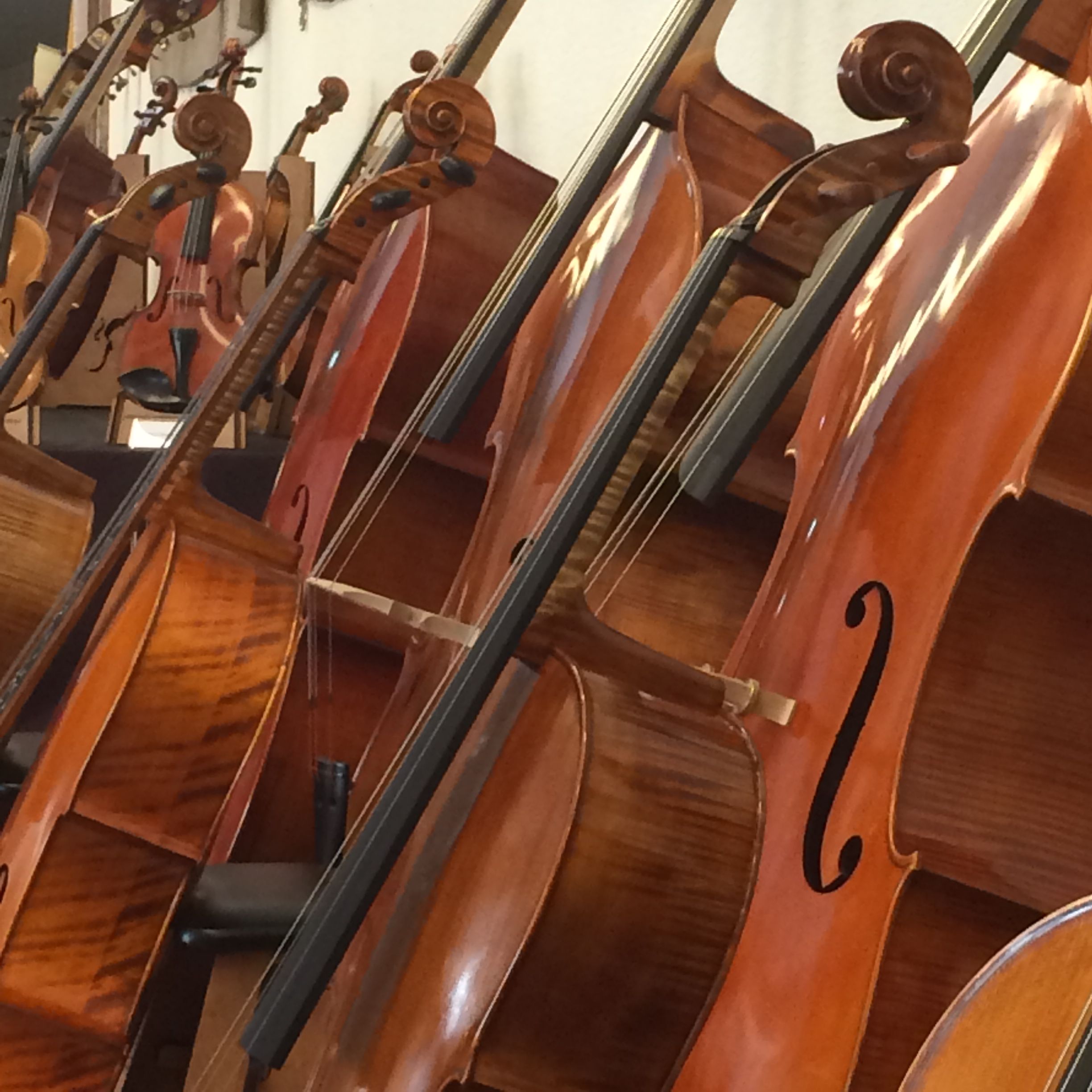
Inside the Sala Palatului. Photo: mine. Please do not reproduce without express written permission.
A part of the infrastructure to which Walker alludes in his Guardian piece has an influence in shaping the perception of the music experienced live, in content as in performance. Works with noticeably little to no energy live, or delivered in a sort of rote manner, are suddenly, owing to the shared frenetic pace of Strada Știrbei Vodă and Calea Victoriei outside, infused with a manic quality. The effect also works in reflection, acting as a nifty sort of mirror to those concerts in which joy and good humour arise naturally, and there are plenty of those performances as well. The streets outside are bustling, sizeable thoroughfares; renamed after the 1989 revolution, they act as sharp lines of demarcation between festival venues (the Sala, together with the smaller Sala Radio and the Athenaeum, located opposite/behind-ish) and bars, restaurants, cultural attractions, as well as the many hotels used by artists and guests alike. How busy, how rushed, how intense it all felt being in the midst of it all. The festival itself, with its team of kind and ever-patient publicists, assistants, and other personnel, works hard, and is determined to shape a specific impression – Very Impressive, Very Big, Very Wow; like a happier, better version of that giant palace, perhaps. But it can all be too impressive, too big, too wow; the pace and sheer variety can be overwhelming, frenzied, mentally/emotionally/creatively/spiritually exhausting. (I can only imagine what it must be like for visiting artists.) Visits to the Stavropoleos: regular, and required – that, or after a concert, sheer solitude and silence. Following a beautiful performance (usually of a work I hadn’t heard live before) in a hot, stilted venue, the last thing I wanted to do was to rush off to yet another presentation – usually a midnight presentation of an opera. Nu, mulțumesc. I wanted to sit and simply be with the rather miraculous sounds I’d heard sitting in a hot hall in high heels and slowly-dampening hair over the past how-many hours. There was no respite at any bar or restaurant or street, large or small; the winding paths to my own hotel weren’t poetic, they were decrepit, depressing, scary to navigate even in flat sandals. (But oh, I was so grateful for the large bathtub, a rarity in Romanian hotels, or so I was told; I may well have had the biggest one in the city.) The race of footsteps along dim, cracked yellow-lit pathways shadowed by low-hanging branches and peppered with cars, the giggles and glass-clinks like staccato shots in the open-air gardens, the echoes in the long, goldfish-bowl-like, quasi-chic bars of hotels – the quiet contemplation of such creative experience one wished for, in conversation or alone, was simply impossible.
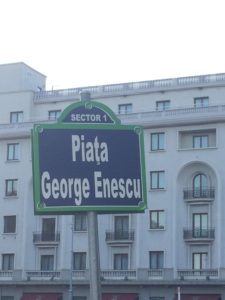
In downtown Bucharest. Photo: mine. Please do not reproduce without express written permission.
Still, it’s tough to look at the festival in any careful way without being perceived as mean or peevish. It’s Eastern Europe, goes the (mostly Western) thinking, what did you expect? Well. I am not sure who is served by fluffy travelogues that ignore on-the-ground realities; certainly such reports fall into the “favourable content” category so favoured by online publishers (and marketers), but I’m not sure they do the artists, the administration, the organizations (visiting and local), or the country as a whole any favours. The city, once described to me as a sort of “shabby-chic Paris” by a previous visitor, is, as Walker noted, a hard-scrabble hodge-podge of new and old, have and have-not, blazingly modern in some sections, achingly dilapidated in others, a terrible if terribly real reflection of the country’s widening social divides. The Enescu Museum, a short walk from the festival locale proper, and with no real connection to the festival itself beyond the composer’s name (bizarrely), is in a horrendous state of disrepair. Perhaps there is a charm in the cracks, the discoloration, the water marks on the ceiling, the curling edges of paper and the worn velvet surfaces, but it’s one that can be experienced, or understood, as a visitor without romanticizing its actual, lived realities for so many; such romanticizing only serves to reduce the direct experience of its people, particularly the many young people I noted working in service positions across the city. They don’t want pity; they want to leave.
My mornings during my visit were largely were spent in a tiny cafe located with small wire chairs and shaky tables set out on a slanted, cracked sidewalk framed by yawning old trees and lining a narrow, similarly-cracked street hosting fast-moving cars. The servers at the cafe were all young, multilingual, polite; most were students, all of them hoped to leave Bucharest, in the near future, most probably for good. One server warmed up to conversation after consecutive days of my asking for extra milk for my coffee, and asked, with a cheeky grin, if I wanted a whole cow set on the pavement tomorrow. He wasn’t planning on staying in his country of birth much longer.
“There’s nothing here for us,” he said, “unless you are willing to work in a corrupt way, and then you can only go so far.” Where would he like to go?
Maybe Germany, although he didn’t think his German was good enough. Possibly France, probably Spain. Had he been? “Yes, Madrid is fantastic!” A broad smile, as he collected my empty mug. “Better coffee than here.” Had he been to any Enescu Festival concerts? “Only one, but that hall is so hot and awful. We go for other things here, you know, big musicals.” Did I know about them? Yes, I’d seen the posters outside the venue. “Sometimes I’ll go for those, but I don’t want to sit there sweating to music I didn’t know. And the tickets for the festival…” he said, waving at a persistent fly with his free hand, his brown eyes rolling up, “pfffft, I’d rather spend my money on other things. Maybe I’m a bad patriot, but… I don’t care, really. I’m too busy trying to survive, you know?”

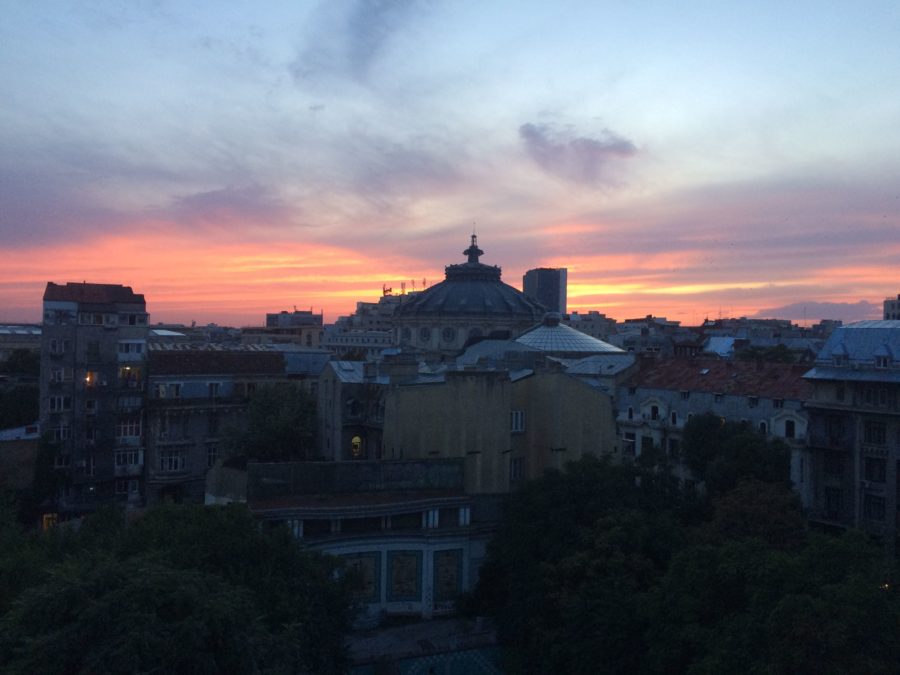
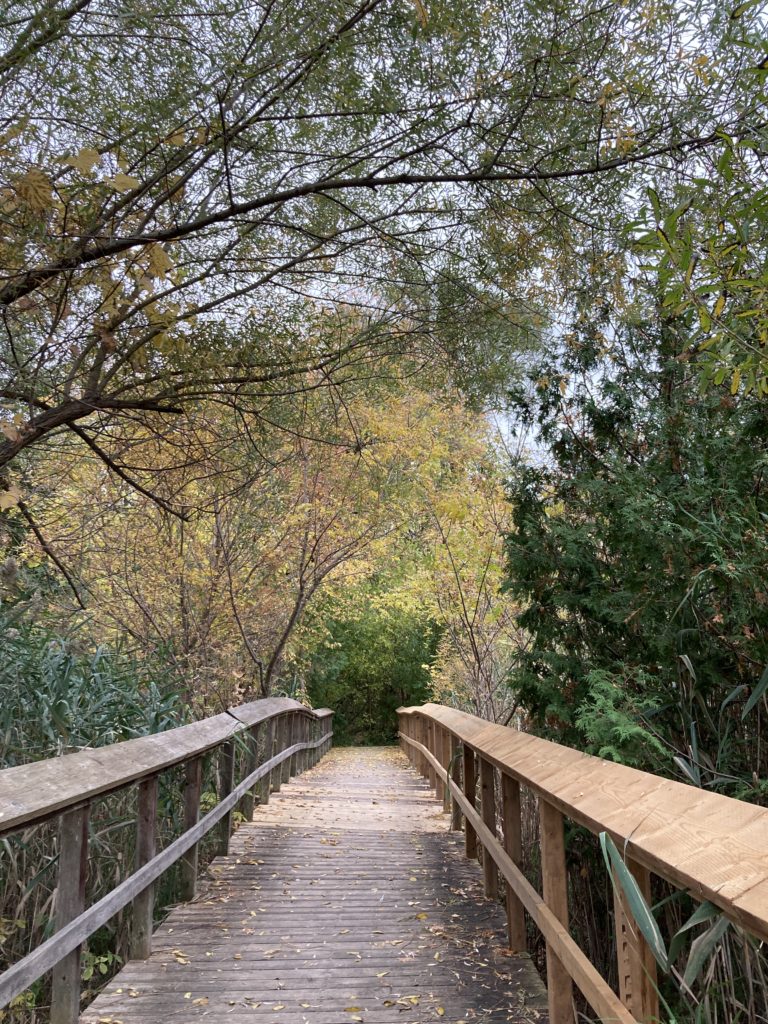
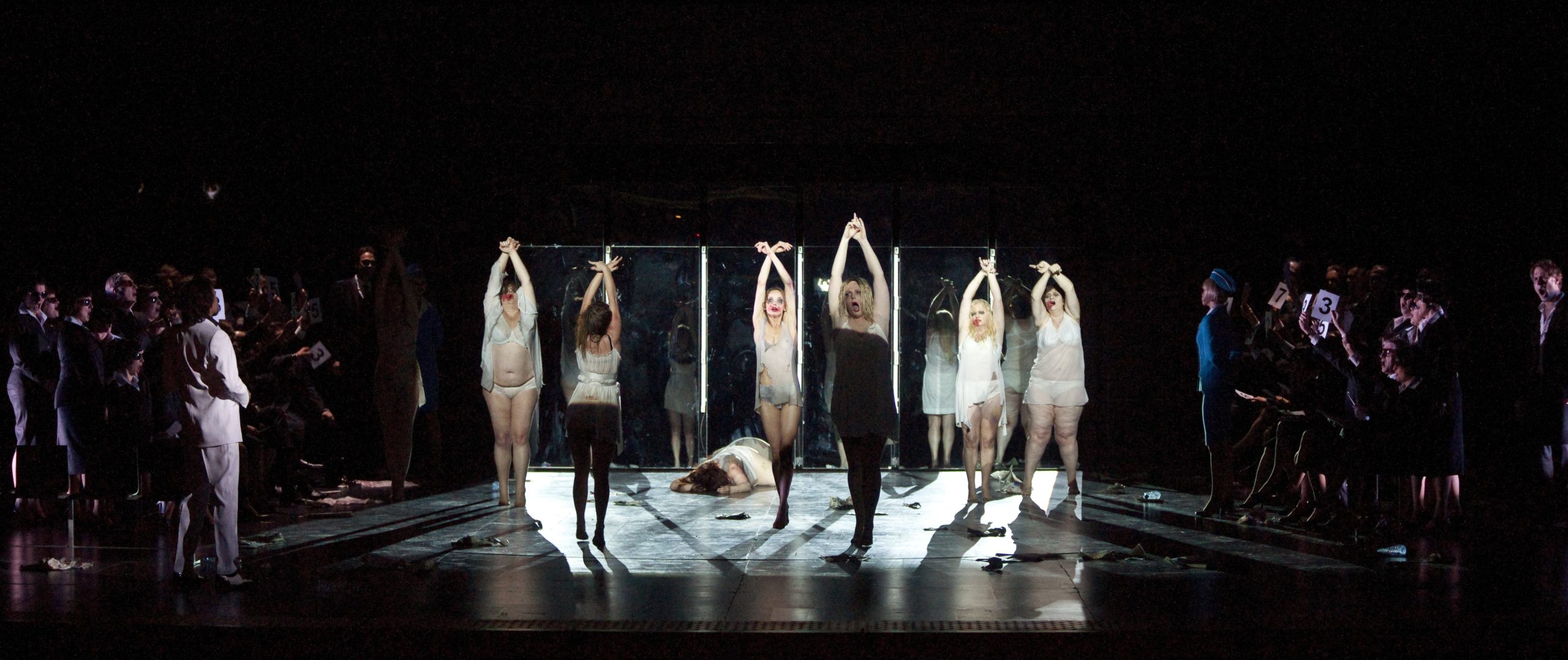
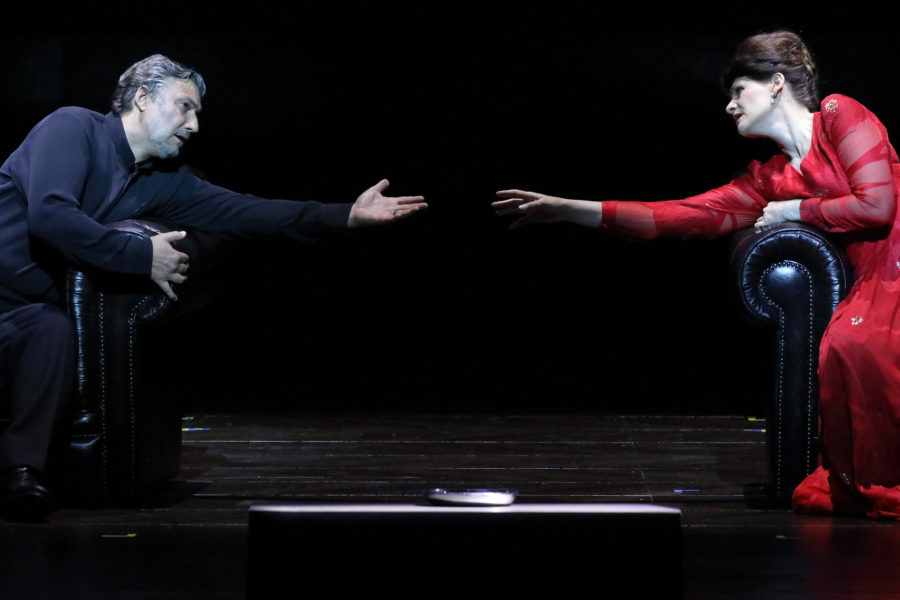
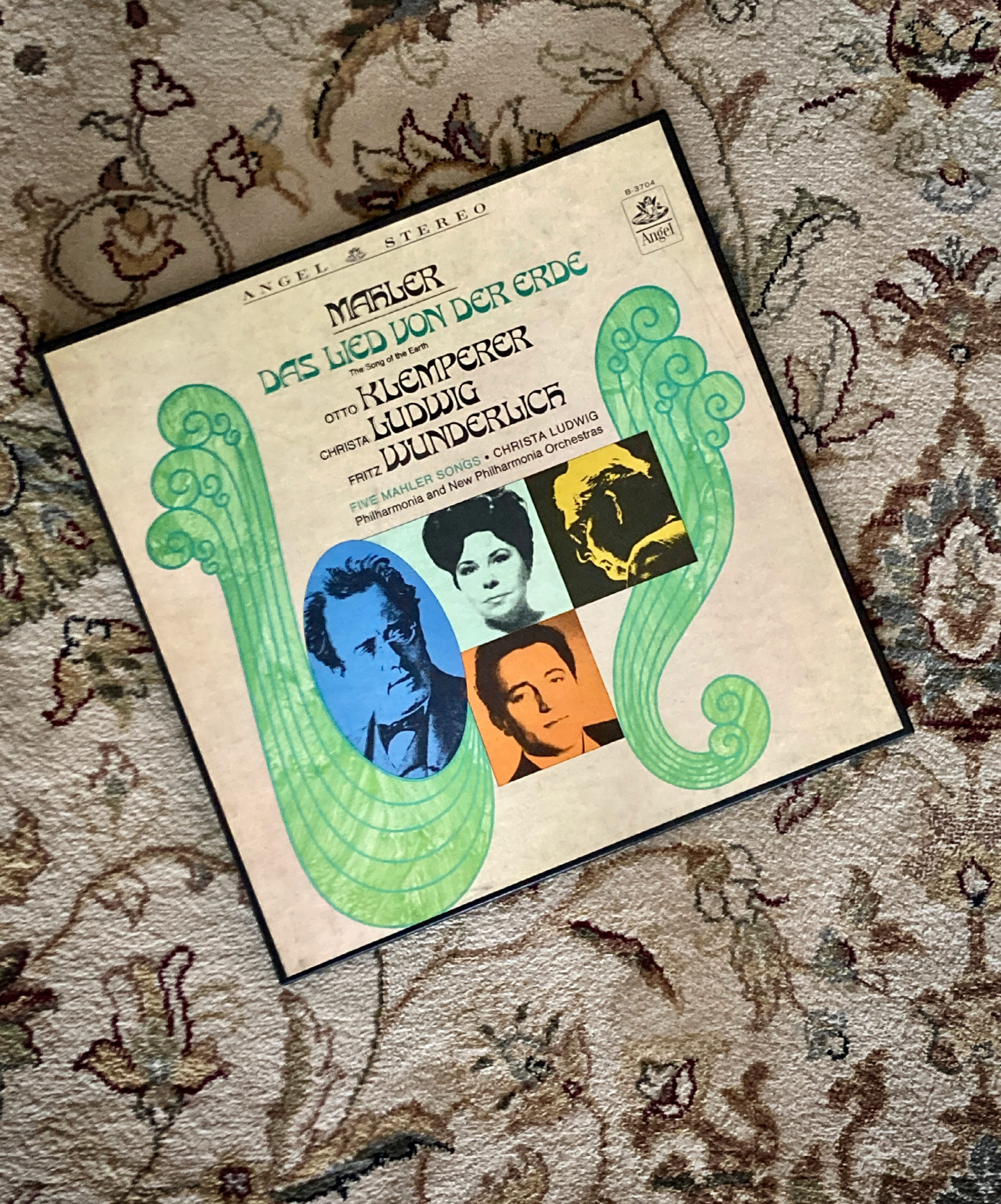
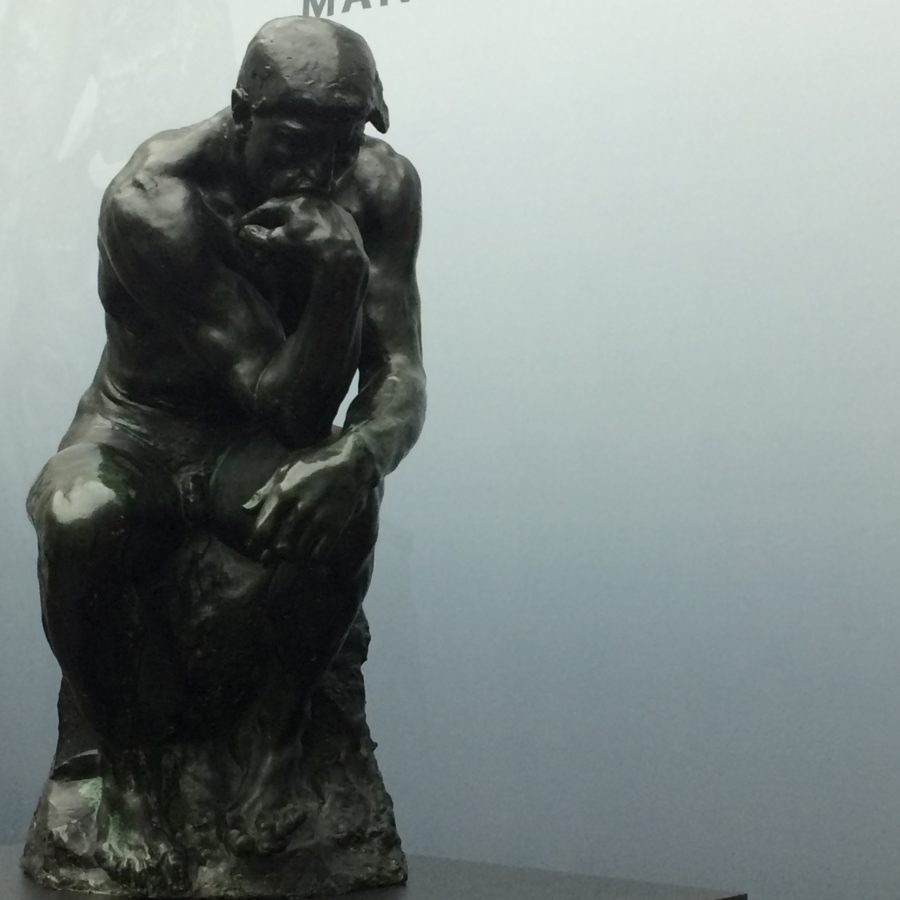
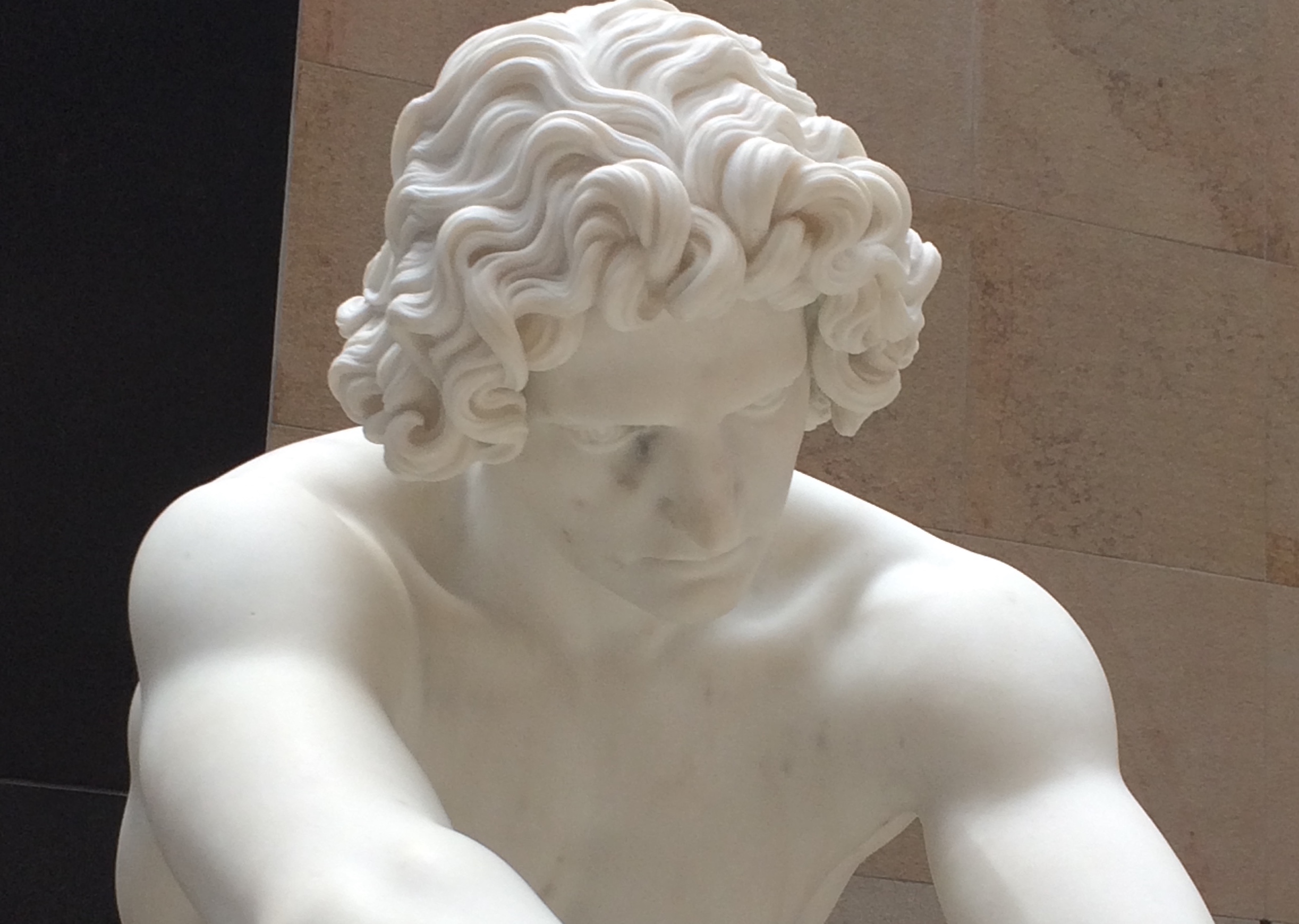
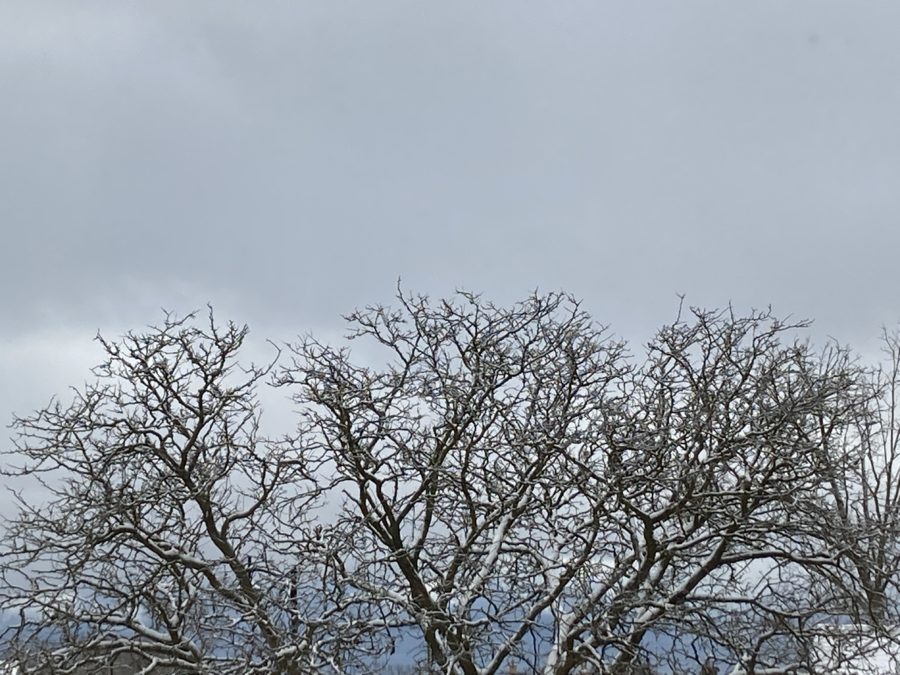
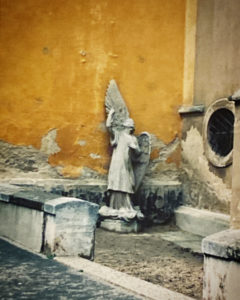
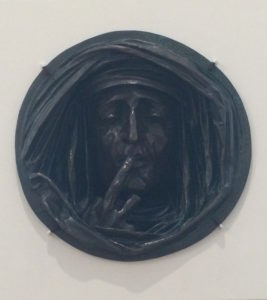

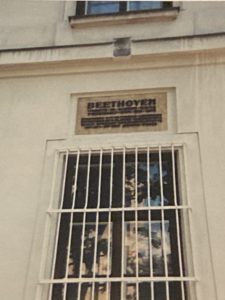
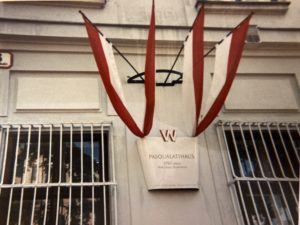
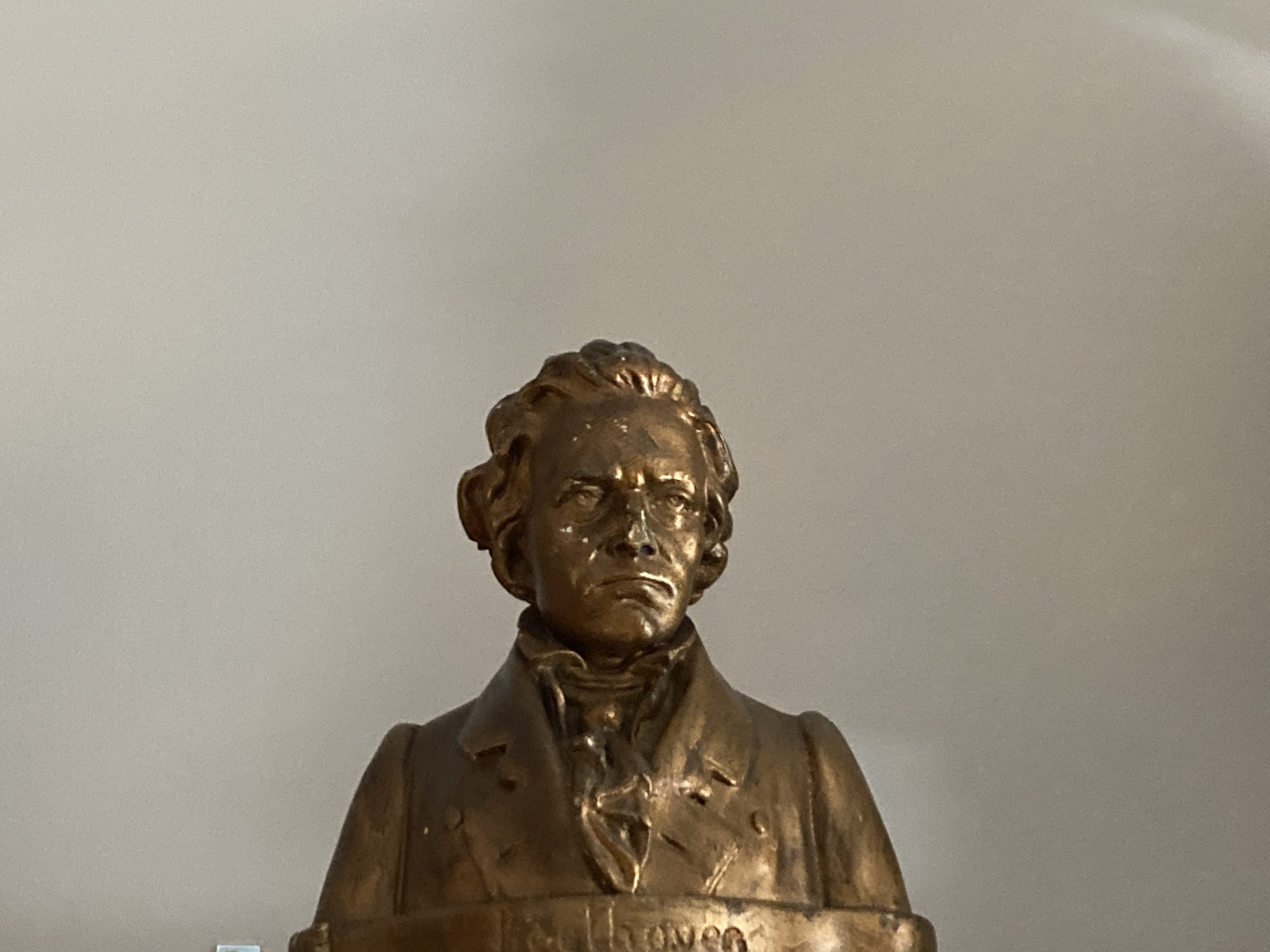
 So how much do you see crowdfunding being a model for creative endeavours in 2021 and beyond then?
So how much do you see crowdfunding being a model for creative endeavours in 2021 and beyond then?